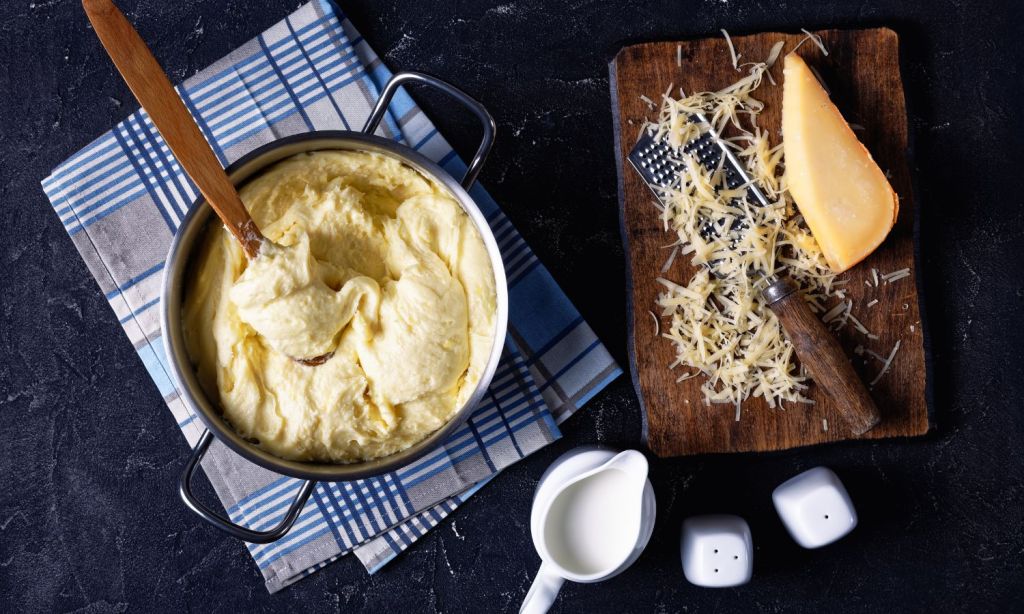A French dish with a rich history and consistency — it’s made with potatoes, butter, cheese and cream — has popped up on a few Australian menus. As for whether it has the potential to go mainstream, the jury’s out.
Called aligot, the puréed dish has been served by Maker and Monger in Melbourne’s Prahran Market, Gavroche at Sydney’s Kensington Street precinct and Folly’s Bar and Bistro in North Sydney. It’s been a temporary addition to the menus of all three places.
Gavroche showed its aligot in a TikTok of its Le Petit Menu, a set menu available May 29 to September 26. Its velvet texture when pulled out of its dish with a spoon was mesmerising. It looked like a fondue but more elastic.
It’s thought aligot was invented in the 12th century by French monks who lived in regional monasteries. They made the hearty dish for Christian pilgrims heading to Santiago de Compostela, a pilgrimage site in north Spain. The original version featured bread and cheese but in the 16th century, potatoes were added. Today it’s served in France alongside sausages, veal, lamb and pork.
“Aligot preparation is very challenging,” says Anthony Femia, owner of Maker and Monger. “It sounds simple when you read the ingredient list of potatoes, butter, cream and cheese but each component needs to be a certain type.”
Potatoes need to be at their starchiest and the potato used is only grown in summer. The cream needs to be pouring cream and not too fatty which would affect the silkiness of the dish. The butter needs to be slowly softened and not split.
The process takes at least three hours, an hour of which is dedicated to stirring and combining the cheese with the potato mixture. For it to be real aligot, you also need to use the right cheese: tomme fraiche which comes from Auvergne, France. The cheese is made from lightly warmed and pressed curd aged six months to a year.
“We are the only shop in Australia that takes the time and money to source and airfreight tomme fraiche in its purest form,” says Femia. “Chefs can cheat [making aligot] with a mixture of gruyere and mozzarella but it becomes a heavier dish.”
Gavroche’s head chef Batiste Gouraud was inspired to include aligot on Le Petit Menu after travelling through the Auvergne region of France. He thought the rich and satisfying dish seemed like a good winter warmer so fitting for the seasonal menu.
“Aligot is all about balancing quality ingredients with precise technique,” Gourard says. “The key is in the final step when we slowly incorporate French cheese while stirring, creating its signature smooth and stretchy texture.”
Folly’s served a twist on aligot last year with a mash made of potatoes, garlic, thyme and shredded mozzarella. Its chef took the process further, freezing the mash before portioning it, rolling the pieces in starch and deep drying them. The result was crispy balls of potato with a gooey inside.
“We knew we wanted an interesting potato dish as part of our sides and we’re a Euro-inspired bistro so aligot seemed like a great fit,” says the venue’s co-owner Lachy Sturrock. “Our diners went nuts for the aligot balls. They were by far and away our most popular side dish.”
Femia says diners at a one-off event Maker and Monger had for Bastille Day this year had a similar positive reaction to aligot. They loved the theatre of stretching it as the chef prepared and served it and the unique clean flavour with the tomme fraiche.
“While it sounds like a rich dish, the tomme fraiche makes it very palatable and easy to consume,” he says. “It’s a community dish after all, designed to be shared with large numbers.”
As for whether aligot is likely to become more readily available in Australia in the coming years, Femia doubts it given the time and money it takes to make. “It’s great for one-off events but very difficult for the practicality of an Australian restaurant,” he says.
That said, the team at Gavroche has been so thrilled with how well it’s been received on Le Petit Menu that it’s considering making it a permanent fixture menu. Gourard says if other Australian restaurants offered it, for it to succeed, they would need to be committed to its traditional preparation and creating an interactive, engaging experience serving it.
“We’ve always been about offering authentic and memorable French cuisine and aligot perfectly embodies that mission,” Gourard says.
Related: This Native Ingredient Is Transforming Australian Restaurants
Related: Is Australia Ready for Authentic Mexican Cuisine?
Read more stories from The Latch and subscribe to our email newsletter.

